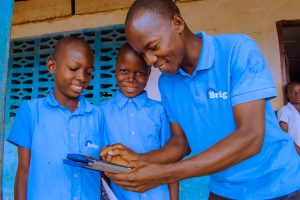What Africa can teach the world about the role of data in education transformation
The world’s largest gathering of national education leaders is taking place in London this week. Ministers from around the world are gathered just a stone’s throw from the site of King Charles’ coronation in Westminster, at the Education World Forum (EWF). Representing Liberia is Prof. D. Ansu Sonii, Liberia’s Minister of Education. But there will be no pageantry. This global ministerial gathering has the sober task of debating the future of education.

Teacher Anderson Wallie from Gbellie Public School, Nimba County
Over the years, EWF has developed a reputation as a place where learning leaders from around the world can talk openly and honestly with their peers and industry partners, sharing ideas and experiences about what is working in education development – and what is not. And it is clear that these conversations need to be held.
World Bank Education Director, Jaime Saavedra, calls the current state of global learning “the most serious crisis in education in 100 years.” In addition, UNESCO estimates that more than half of children and adolescents around the world are not learning, failing to meet minimum proficiency standards in reading and mathematics.
Even in countries many might have assumed to have nailed down the workings of a successful education system, there are still problems. A recent New York Times article paints a rather harrowing picture drawing attention to the fact that “about one in three children in the United States cannot read at a basic level of comprehension”, a statistic that researchers say can be put down to the fact that many children are simply not being correctly taught.
In sub-Saharan Africa, the World Bank estimates 90% of 10-year-olds are unable to read a simple sentence with understanding – even though four out of five primary age children go to school.
But there are visionary governments tackling the challenge of such learning poverty. And many of them can be found here in Africa.
NewGlobe – which is a partner of Education World Forum- supports national and regional African governments to overcome infrastructural and resource challenges to achieve exceptional learning gains for their children.
In Liberia, NewGlobe is also the technical Partner of Bridge Liberia, the Liberian Government’s Largest Partner in the Liberian Education Advancement Program (LEAP).
One of the many conversations at this year’s EWF is centred around how education stakeholders can measure skills, knowledge, understanding etc of schools and teachers as well.
As UNESCO points out:
“A common obstacle preventing the alignment of a vision with a realistic target is the lack of regularly collected data of good quality on learning outcomes”.
But collecting data is only the start towards transforming learning outcomes. The data must be accessible, easy to interpret, and solution oriented.
Recognizing this need for relevant data to make informed decisions about education, NewGlobe through Bridge Liberia has been working with the Liberian Government to create immersive visual education data experiences to help bring clarity to decision making.
Each teacher in every school supported by Bridge Liberia is equipped with a handheld teacher tablet, loaded with expertly constructed lesson guides based on the Liberian National Curriculum. Each one leverages effective techniques that have been tried, tested and refined for the greatest impact on learning. But as well as supporting each and every teacher, their tablets also deliver a treasure trove of data, including teacher and student attendance, lesson completion and test results.
Suddenly, education leaders can see what is happening in every classroom in every school – virtually in real time.
Behind such African success lies clear academic evidence.
An independent study led by 2019 Nobel Prize winning economist Professor Michael Kremer investigated the methods that underpin every government program supported by NewGlobe, and found learning gains among the
“largest ever measured in international education”.
Results from the study of NewGlobe-supported schools in Kenya found primary students gain almost an additional year of learning, learning in two years what students in non-NewGlobe supported schools learn in nearly three. Early childhood development students had even greater outcomes, gaining almost an additional year and half of learning in two years.
The very same methods are the backbone of Bridge Liberia, the mainstay of the Liberian Government’s LEAP education improvement program and another African success supported by NewGlobe. Bridge Liberia students gain 2.5 years of additional learning after 3 years with Bridge Liberia, and 81% of Bridge Liberia students are proficient or basic readers, vs. only 33% of students in traditional public schools.
The African programs supported by NewGlobe, underpinned by real-time data gathering, consistently demonstrate substantial learning gains through evidence-based improvements. If these kinds of results could be replicated at scale across public systems, students across the globe could see huge learning gains, pushing countries up education league tables to match those with incomes three or four times greater per person, and further strengthening countries with robust systems.
Over the coming days, national education leaders will debate and discuss the solutions to the global learning crisis at the Education World Forum. Data empowers leaders, informing them what is working well, and where improvements must still be made. And, Africa is demonstrating to the world what data-driven education transformation can achieve.

